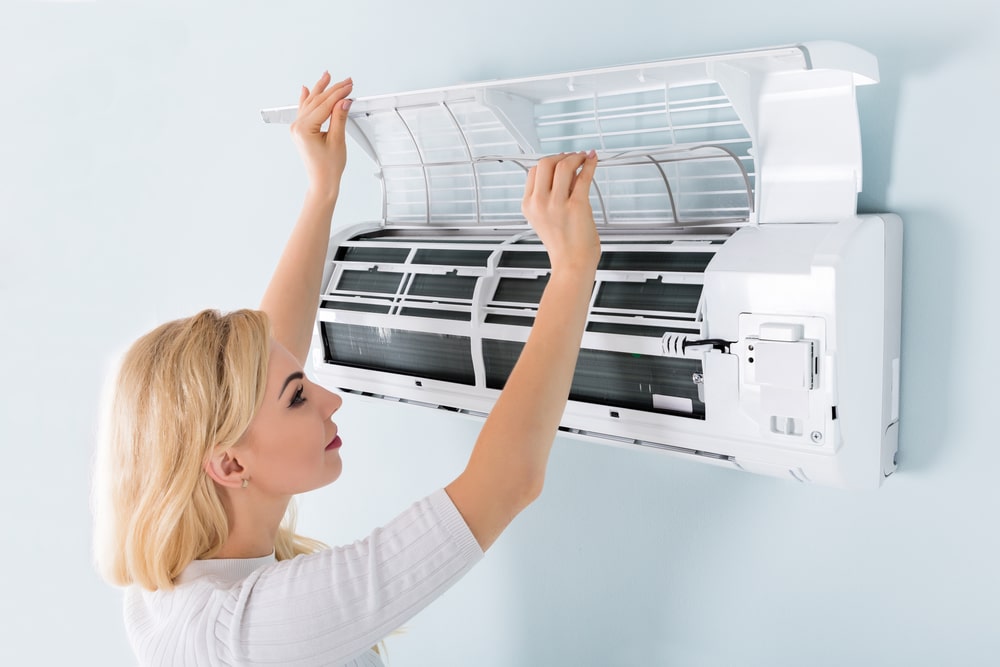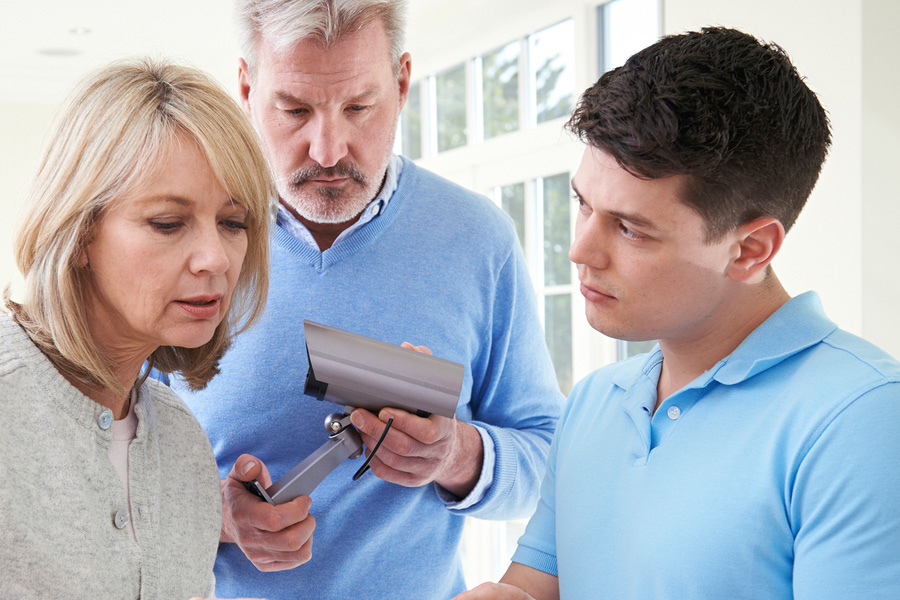- Health: Quality indoor air services can help to eliminate pollutants, allergens, and harmful microorganisms from the air, reducing instances of allergic reactions or respiratory problems.
- Comfort: Maintaining good indoor air quality can increase comfort levels by eliminating odours and maintaining a consistent temperature.
- Energy Efficiency: Proper ventilation and air filtration systems can improve energy efficiency by maintaining optimal temperature levels, which can lead to reduced energy costs.
- Longevity of HVAC Systems: Quality indoor air services ensure that your HVAC systems are well-maintained and free from dust and debris that could damage them or hamper their performance over time.
- Regular inspections of HVAC systems
- Cleaning and maintenance of ducts
- Installation or replacement of high-efficiency filters
- Testing for harmful pollutants like radon or carbon monoxide
These professional services ensure that the job is done correctly with suitable equipment and expertise, guaranteeing improved indoor air quality.
Professional Air Conditioner Repair in Orlando FL for Enhanced Performance
Learn about air conditioning repair.
Over time, various factors such as wear and tear can cause an AC unit’s performance to decline. Professional repair services are crucial in enhancing its performance, improving energy efficiency while prolonging the lifespan of the unit.
- Detecting issues early: Professionals have the knowledge to identify potential problems before they become major concerns.
- High-quality repairs: Trained professionals use high-quality parts during repairs, ensuring durability and reliable performance.
- Optimal system operation: Regular servicing ensures that the AC unit operates at its best, providing efficient cooling and reducing energy bills.
- Extending lifespan: By addressing small issues promptly, you can prevent catastrophic failures that could shorten the lifespan of your AC unit.
In essence, professional AC repair services are an investment that pays off in the long run through enhanced performance and prolonged system lifespan.
Professional HVAC Service in Orlando FL: Enhancing Your Air Conditioning Unit’s Performance Through Repair
Every homeowner understands the importance of an efficient air conditioning unit, especially during the hot summer months. However, without regular professional maintenance and repair, your air conditioning unit may not operate as efficiently as it should. There are many benefits to enhancing your air conditioning unit’s performance through professional repair.
One of the primary advantages of professional AC repair services is that they can significantly boost the efficiency of your air conditioning unit. An efficient AC system means that it will consume less energy while still providing optimal cooling. This increase in efficiency can lead to a substantial reduction in your monthly electricity bills.
- Regular Maintenance: Regular maintenance is an excellent way to pre-empt any problems that may arise with your AC system. Professional technicians can carry out a thorough inspection and identify any potential issues before they become significant problems that require extensive repairs.
- Air Filter Replacement: Over time, air filters become clogged with dust and other debris, reducing their effectiveness in filtering out particles from the air. Professionals can replace these filters regularly to ensure clean and healthy airflow.
- Repairing Leaks: If there are leaks in your AC system, it will not cool effectively, leading to higher energy consumption. Professionals have specialized tools that they use to locate and seal these leaks.
- Cleaning Coils: Over time, the condenser and evaporator coils in your AC system may accumulate dirt which can reduce their ability to absorb heat effectively. Regular cleaning by professionals ensures these coils function optimally.
- Checking Thermostat Settings: Sometimes, all that’s needed is a simple adjustment of the thermostat settings for enhanced performance.
- Component Replacement: In some cases, certain parts of an AC unit might need replacement for it to function optimally – like a worn-out fan or a malfunctioning compressor. Professional technicians can easily identify these issues and replace the components.
Apart from these, conducting regular tune-ups ensures the longevity of your AC system. Regular checkups by professionals help spot potential issues and fix them on time, prolonging the lifespan of your AC unit.
All these efforts contribute to enhancing the performance of your air conditioning unit, making it more energy-efficient and effective in cooling your home while also reducing your carbon footprint. Therefore, investing in professional repair services is a wise decision that guarantees optimal comfort and cost savings in your home.
Comprehensive HVAC Services in Orlando for Your Air Conditioning Unit
Air conditioning units, like any other mechanical device, require periodic maintenance and comprehensive overhauling to prolong their lifespan and maintain optimal performance. This article aims to provide insight into the various overhauling services available for your air conditioning system.
- Systematic Inspection: The technician commences by performing an in-depth review of the entire air conditioning unit. This includes checking electrical connections, assessing refrigerant levels, inspecting coils, evaluating thermostat accuracy and monitoring airflow.
- Cleaning: Over time, dirt and debris can accumulate within your AC system leading to blockages or decreased efficiency. During an overhaul, components such as the condenser coils and evaporator are thoroughly cleaned.
- Repair or Replacement: Once the inspection is complete, any faulty or worn-out parts identified are either repaired or replaced to restore optimal functionality.
- Performance Check: After repairs or replacements are completed, a performance test is carried out to ensure that the system is operating effectively.
- Improved Performance: Regular servicing ensures that all components of your AC system are in good working order. This not only optimizes its cooling efficiency but also reduces energy consumption.
- Prevention of Major Breakdowns: Systematic inspections allow technicians to identify minor issues before they escalate into major problems that could lead to a complete breakdown of the unit.
- Enhanced Lifespan: A well-maintained AC unit can last many years longer than one that is neglected.
- Better Air Quality: Clean AC systems free from dust and dirt offer better air quality, reducing the risk of allergies and respiratory issues.
- Cost-effective: While comprehensive overhauling services might seem costly initially, they could save you significant amounts in the long run by preventing major breakdowns and reducing energy consumption.
To sum up, comprehensive overhauling services play a crucial role in maintaining your air conditioning unit’s efficiency, promoting better indoor air quality, and prolonging the unit’s lifespan. It is therefore recommended to have your AC system regularly serviced by professional technicians who can provide detailed inspections and perform necessary repairs or replacements as needed.
Effective AC Repair Solutions in Orlando, FL
Modern life is often dependent on the convenience of air conditioning, particularly in warmer climates. But like any other machine, AC units are prone to breakdowns and require regular maintenance. However, homeowners and commercial establishments often deter the upkeep due to fear of high costs. This piece aims to shed light on how effective and budget-friendly air conditioning repair solutions can be.
Cost-Effective Solution for Air Conditioning Repair in Orlando FL
- Faulty Thermostat Repair: The thermostat is a crucial component that controls and maintains your desired temperature level. When it’s faulty, it may lead to severe comfort issues but can be fixed inexpensively.
- Leakage Repair: Refrigerant leaks not only impact your air conditioner’s efficiency but are also harmful to the environment. Identifying and fixing leaks early on saves you money in the long run.
- Cleaning Services: Regular cleaning of filters and ducts enhances your unit’s performance significantly. It improves efficiency hence reducing energy consumption.
The Premier Air Conditioning Service in Orlando FL: Preventing Major Breakdowns
- Inspecting for potential leaks
- Cleaning or replacing filters
- Checking refrigerant levels
- Cleaning coils
These measures ensure smoother operation of your AC unit, ultimately saving you money in unnecessary replacement costs.
Air Conditioning Replacement in Orlando FL for Enhanced Energy Efficiency
Air conditioners account for a significant portion of energy usage in many homes and businesses. A malfunctioning unit will consume more power while delivering less cooling, leading to higher energy bills. Regular AC repair and maintenance ensure the unit operates at maximum efficiency, thereby reducing energy costs.
Air Conditioning Installation in Orlando FL: A Guide to Prolonging the Lifespan of Your AC Unit
Air conditioner units are an investment, and like all investments, you want them to last as long as possible. Regular maintenance by professional repair services can significantly extend the lifespan of your unit. This saves you from prematurely investing in a new system.
Orlando Air Conditioning: Final Thoughts
While the cost of regular AC repair might seem like an unnecessary expense initially, it pays off in the end by preventing major breakdowns and enhancing the unit’s efficiency. The key is to find a reliable and professional service that offers transparent pricing. Remember, regular maintenance not only keeps your air conditioner running smoothly but also contributes significantly to your comfort and wellbeing.
Professional Examination and Repair of Commercial Air Conditioning Systems
Maintaining the efficiency of commercial air conditioning systems is essential due to their large scale use in offices, malls, hotels, and other commercial spaces. This aspect necessitates professional examination and repair services to ensure the optimal functioning of these systems. This section will explore the benefits of professional examination and repair services for commercial air conditioning systems.
Importance of Regular Professional Examination
- Detects Issues Early: Regular professional inspection helps in detecting potential problems at an early stage before they become costly repairs or replacements.
- Maintains Efficiency: With continuous use, dust and dirt build-up can affect the efficiency of your AC unit. A professional examination ensures that any such issues are promptly addressed, maintaining optimum cooling performance.
- Provides System Longevity: Regular maintenance increases the lifespan of your air conditioning system, saving you from premature replacement costs.
Necessity for Professional Repairs
- Expertise & Experience: Professionals possess in-depth knowledge about different AC units’ specifications and working principles. Their expertise allows them to diagnose issues accurately and perform necessary repairs effectively.
- Safety Measures: Commercial AC units are intricate machines that include electrical components. Any mishandling can lead to accidents. Trained professionals have knowledge about safety protocols, ensuring safe repair processes.
- Warranty Protection: Most warranties stipulate that only licensed professionals must handle repairs for them to be valid. Engaging professionals helps maintain warranty protection.
Steps Involved In Professional Examination & Repair
- Inspection: The technician will visually inspect all parts of your AC system for any signs of wear or damage.
- Cleaning: The next step involves cleaning various parts like filters, coils, fan blades etc., which could affect your system’s performance if clogged.
- Testing: After cleaning, the technician will test your system for proper operation.
- Repair or Replacement: If any parts are found to be malfunctioning, the technician will repair or replace them.
- Diagnosing the Problem: Using advanced tools, professionals can accurately identify the root cause of the problem.
- Providing a Detailed Estimate: Once diagnosed, they provide a detailed estimate of costs for approval before proceeding with repairs.
- Performing Repairs: After approval, they commence with necessary repairs ensuring functionality is restored.
To summarize, professional examination and repair of commercial air conditioning systems is not just crucial but also beneficial. It ensures efficient working, prolongs lifespan and mitigates sudden breakdowns that could disrupt your business operations. Hence it is always advised to schedule regular check-ups with certified professionals for your commercial AC systems.
- Understanding the Importance of Quality AC Repair in Orlando
- Understanding AC Repair in Orlando: Why DIY May Not Be Beneficial
- Effective AC Repair in Orlando FL Tips
- Choosing the Best AC Repair Services in Orlando FL
- Discovering the Best Services for AC Repair in Orlando FL

